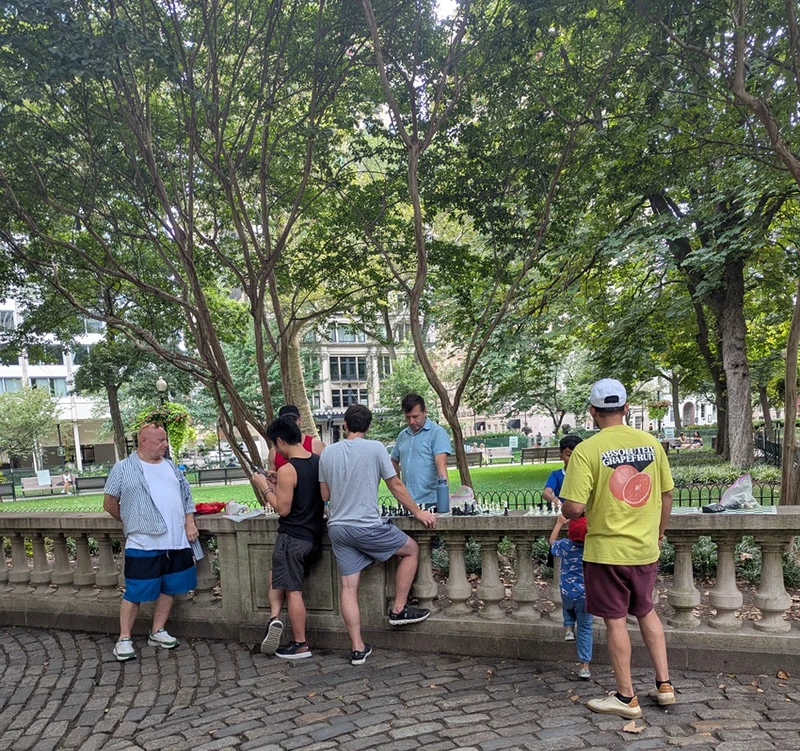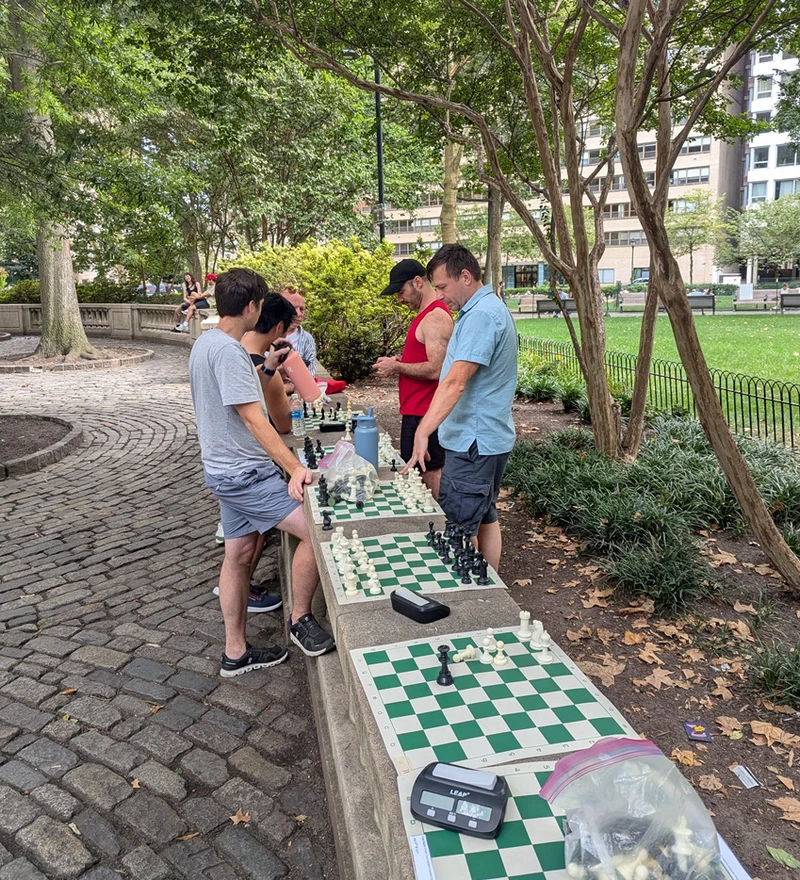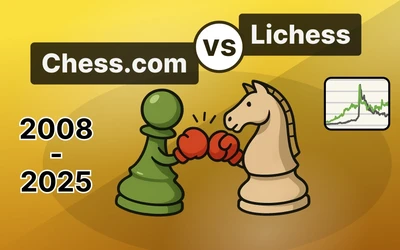
Rittenhouse Square Chess
And my "return" to OTB classical.I found myself in Philadelphia last Sunday, so I finally had a chance to stop by Rittenhouse Square to check out the chess scene.
Some local chess enthusiasts set up games on a wall near the center of the park, near the fountain. Boards and clocks are provided.
It was a small crowd - fewer than 10 players while I was there. Someone told me that on a typical Sunday 1 PM - 6 PM session, they can have as many as 20 players.

I found out later that the older man on the far left is none other than FM Michael Shahade And yes, the guy in the red tank top was IM Greg Shahade. I only learned this days later, when sharing these photos in the Perpetual Chess discord. The two masters left while I was playing. FM Shahade did comment one of my games, however. I was in a double rook endgame and he commented "looks like you have a chance" - then I made a move. "Nope that wasn't it." D'oh.
Greg Shahade is apparently the fellow in the red tank top below. It's a bummer I didn't end up talking to him, because I literally had just listened to his interview with Ben Johnson during my drive to Philly earlier that day!

Oh, also I played a classical OTB Tournament
After months off, I finally played an OTB classical tournament at Marshall - another Weekly U1600 90+30. My previous tournament, back in the Spring, was an ALTO at Marshall where, all my opponents being lower-rated, I went 3.0/4. One of the commenters on my blog post recap scolded me for not playing stronger players. Well, I'd like to report that, at this tournament, despite not being the lowest rated by a long shot, all my pairings were against stronger players. I went 0.5/4 and lost 50 USCF rating points (having to take 2 byes in the SS/6 format, with one being a 0-point bye because I was under the weather).
So... happy now?
Unfortunately, my fencing training schedule does not align with the Weekly Weds schedule, so I'll need to fall back to 1-day tournaments i.e. quads, G50s, etc. Also, sadly, Marshall is discontinuing their ALTO tournaments - lack of interest.
Round 2
I misplayed the two-knights and had to defend a backwards pawn into a losing endgame.
Round 3
I got a great position out of the opening but - instead of pressing my advantage - thought to myself "I have to finish developing before I attack." From this lack of initiative, my opponent got a draw.
"Finish development before you attack" is one of those lies they tell beginners that I have to erase from my brain.
Round 5
My opponent played a London, which included some lemon moves, and AGAIN I didn't take initiative and instead "finished development." Again, I misplayed to an endgame, and failed to calculate properly, blundering a draw.
I need to just start practicing rook endgame puzzles daily, so the tactics and candidate moves are burned into my brain.
Round 6
At this point I just wanted the tournament to be over. I was paired with a senior on his rating floor and thus probably under-rated (in terms of experience, at least).
I blundered horribly early, and even though I got back an exchange later I was still completely losing.
Silver Lining
On the bright side, I have some good take-aways from this tournament, even though I didn't have a win:
- I got to play my repertoire in all 4 games
- In several of the games I had a slight advantage out of the opening.
- I just need to be aware of when to strike vs play lemon "developing moves."
I need to work on:
- Taking initiative out of the opening, not playing "developing moves" when I sense my opponent is passive.
- Rook endgames
- Calculating longer at slightly harder puzzles - I've been focusing too much lately on over-training simple 2 - 3 move tactics (which I think is important but I've been doing it too much lately).
- In general, using more of my time in critical positions, and when calculating *always* finish the line with my opponent's move, not my own.
On the point above about taking initiative, here is a great video on the subject:
You may also like
 IM Fins
IM FinsWhat I Learned from Playing LoneWolf League Season #37
Reflections from an International Master's debut ChessMonitor_Stats
ChessMonitor_StatsWhere do Grandmasters play Chess? - Lichess vs. Chess.com
This is the first large-scale analysis of Grandmaster activity across Chess.com and Lichess from 200… WFM fla2021
WFM fla2021Bishop or Knight? Which one to choose?
In this blog post, I want to show you some practical examples to help you understand when a bishop i… noahlz
noahlzMore Opening Principles for Beginners
"Now what...?" noahlz
noahlzReturn to Boylston
Game + more Chess Books! noahlz
noahlz